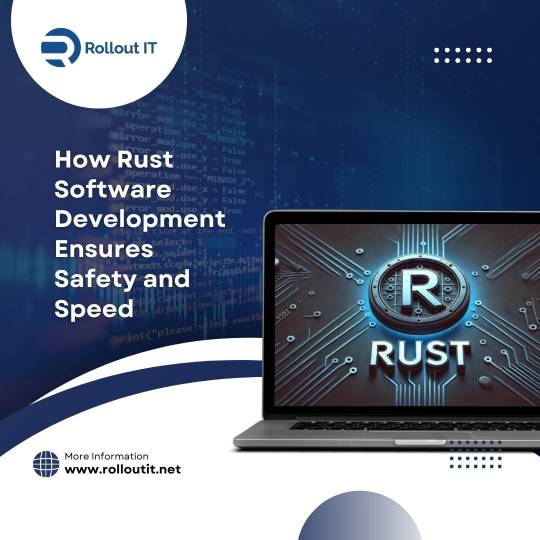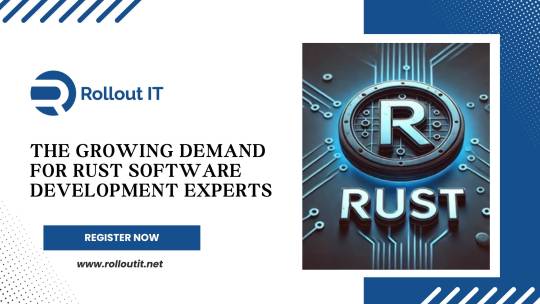#Rustsoftware
Explore tagged Tumblr posts
Text
Choose us for expert Rust software development to unlock high-performance, secure, and scalable solutions. Our skilled developers specialize in building robust applications that prioritize speed, reliability, and safety. With extensive experience in Rust, we ensure clean code, optimized performance, and error-free software that meets your project’s unique requirements. Whether you need system-level programming, web development, or network solutions, our team is dedicated to delivering top-notch results. Trust us to leverage the full potential of Rust and elevate your project to new heights of excellence.
1 note
·
View note
Text
How to Outsource Web Development and Manage Remote Developers

Businesses are quickly using web development outsourcing as a clever, economical way to satisfy increasing demands in today's fast-paced digital environment. Whether you're a startup looking to build an MVP or a scaling enterprise needing advanced functionality, Custom Web Development Outsourcing offers flexibility, expertise, and speed without the overhead of an in-house team. But success doesn’t end with hiring; managing remote developers efficiently is the real game-changer.
Below, we’ll walk you through a proven strategy to outsource web development successfully and keep your remote full-stack development outsourcing team aligned, productive, and motivated.
Why Outsource Web Development?
Companies choose to outsource web development for several compelling reasons. You gain access to global talent, reduce operational costs, and speed up project timelines. Full-Stack Development Outsourcing also allows businesses to scale resources up or down depending on project needs ideal for dynamic or high-growth environments.
However, the real advantage lies in tapping into niche expertise. From front-end UI/UX to robust back-end architecture, outsourcing ensures you get specialists for every layer of your application.
Step 1: Define Your Project Scope Clearly
Before you dive into Custom Web Development Outsourcing, you must have a crystal-clear understanding of your goals. Define your website or app’s features, user flow, and any technical requirements. The more detail you provide, the better your development partner can deliver.
Tip: Use a product requirement document (PRD) to outline your vision. Include user personas, expected functionality, deadlines, and budget.
Step 2: Choose the Right Development Partner
Not all agencies or freelancers are created equal. Look for teams with a proven track record in full-stack development outsourcing, particularly within your industry or technology stack. Check reviews, request case studies, and conduct interviews.
Key traits to consider:
Strong communication skills
Experience in remote collaboration
Portfolio aligned with your needs
Transparent pricing and timelines
Step 3: Set Up Robust Communication Channels
Communication is the backbone of managing remote teams. Use tools like Slack for real-time messaging, Trello or Jira for task tracking, and Zoom or Google Meet for regular video check-ins.
Schedule weekly stand-ups and monthly strategy meetings to stay in sync. Ensure developers feel empowered to raise questions or concerns.
Step 4: Establish Clear Workflows and Expectations
When you outsource web development, clearly define responsibilities, deliverables, deadlines, and feedback cycles. Use agile methodologies like Scrum or Kanban to ensure transparency and consistent progress.
Provide a centralized knowledge base so developers can access documentation, code guidelines, and design assets in one place.
Step 5: Focus on Quality Assurance
With Custom Web Development Outsourcing, quality control becomes essential. Set up automated testing, code reviews, and staging environments to catch issues early. Assign a dedicated QA team or individual responsible for maintaining code standards.
Remember, outsourced doesn’t mean out-of-sight. You should still monitor performance and conduct periodic reviews.
Step 6: Foster Team Culture and Motivation
Even if your team is scattered across time zones, make them feel like part of the mission. Celebrate milestones, provide constructive feedback, and encourage professional growth.
This mindset turns Full-Stack Development Outsourcing from a contract into a partnership — a shift that often results in higher quality, faster delivery, and long-term success.
Final Thoughts
When done right, outsource web development is more than a cost-cutting tactic — it’s a strategic growth move. By combining clear communication, structured workflows, and mutual trust, you can turn any remote team into a high-performing asset. Whether you’re engaging in custom web development outsourcing or looking for full product teams through full-stack development outsourcing, the key is alignment, not just delegation.
#itoutsourcing#softwaredevelopment#itoutsourcinginhungary#staffaugmentation#rustsoftwaredevelopment#rustsoftware#websitedevelopment
0 notes
Text
Rollout IT - Expert Teams for Your Digital Product Needs
Join us on this podcast as we dive into the benefits of IT outsourcing in Hungary. Learn how businesses can save costs, access top talent, and scale effectively by working with skilled tech teams in Hungary. Whether you're a startup or established company, we’ll share insights and real-world examples to help you make informed decisions about outsourcing your IT needs.
0 notes
Text
How to Choose the Right IT Outsourcing Company in Hungary

Hungary has become a prime destination for IT outsourcing due to its skilled workforce, competitive costs, and strong technological infrastructure. Whether you are a startup, a mid-sized business, or a large enterprise, choosing the right IT outsourcing company in Hungary requires careful evaluation. Here’s a step-by-step guide to making the right decision.
1. Define Your IT Outsourcing Needs
Before searching for an outsourcing partner, clearly define your business objectives and technology requirements. Ask yourself:
What type of IT services do you need? (Software development, cybersecurity, cloud computing, etc.)
Do you need Staff Augmentation Companies or a dedicated outsourcing team?
What is your budget for outsourcing?
Do you need full-time, project-based, or part-time support?
What level of expertise and technology stack is required?
By having a clear understanding of your needs, you can narrow down your search to companies that specialize in the right areas.
2. Research and Shortlist Potential Companies
Once you know what you’re looking for, start researching IT outsourcing companies in Hungary. Use search engines, business directories, and review platforms such as Clutch or GoodFirms to find reputable providers.
When shortlisting companies, consider:
Their experience in your industry
Client reviews and testimonials
Case studies showcasing previous work
Certifications and compliance with international IT standards
3. Assess Technical Expertise and Industry Experience
Not all IT outsourcing companies are the same. Some specialize in fintech, while others focus on e-commerce, healthcare, or Full-Stack Development Outsourcing. Check whether the company has expertise in your industry and is familiar with the technologies you require.
Ask the following:
Do they have experience with the programming languages and frameworks you need?
Have they worked on similar projects before?
Can they handle scalability and future growth?
4. Evaluate Communication and Cultural Compatibility
Effective communication is critical when outsourcing IT services. Since Hungary is in the Central European Time Zone, it is well-positioned to collaborate with businesses across Europe and North America. However, ensure the company has a strong communication process, including:
English proficiency for seamless collaboration
Clear reporting and project updates
A dedicated project manager or point of contact
Use of project management tools like Jira, Trello, or Asana
Additionally, cultural compatibility is important to ensure smooth collaboration and shared work ethics.
5. Verify Security and Compliance Standards
Data security and compliance are crucial when outsourcing IT services. Ensure the company follows international security protocols such as ISO 27001 and GDPR compliance.
Ask them:
How do they ensure data protection?
Do they follow GDPR and other legal requirements?
What security measures do they implement to prevent data breaches?
A reliable IT outsourcing company will have clear policies on security and confidentiality.
6. Check Pricing Models and Cost Transparency
IT outsourcing in Hungary is cost-effective, but it’s essential to choose a company that offers a transparent pricing structure. Common pricing models include:
Fixed Price – Best for well-defined projects with clear deliverables.
Time and Material – Suitable for projects with evolving requirements.
Dedicated Team – Ideal for long-term projects requiring ongoing development.
Ensure there are no hidden costs and that the pricing model aligns with your business needs.
7. Request a Trial Project or Consultation
Before committing to a long-term contract, consider requesting a small trial project. This allows you to assess the company’s:
Work quality
Adherence to deadlines
Communication and responsiveness
Many Staff Augmentation Companies in Hungary offer free consultations or pilot projects, helping you make an informed decision.
8. Review Contract Terms and Service Level Agreements (SLAs)
Before finalizing the partnership, carefully review the contract and SLAs. Key elements to check include:
Project timelines and deliverables
Intellectual property rights
Confidentiality agreements
Support and maintenance terms
A well-structured contract ensures both parties are aligned and reduces potential risks.
Final Thoughts
Choosing the right IT outsourcing company in Hungary requires thorough research and careful evaluation. By defining your needs, assessing technical expertise, ensuring compliance, and reviewing pricing models, you can find a reliable partner to support your business growth.
By following these steps, you can make an informed decision and leverage Hungary’s IT outsourcing industry to achieve long-term success.
#itoutsourcing#staffaugmentation#websitedevelopment#softwaredevelopment#rustsoftwaredevelopment#rustsoftware#staffaugmentationservices
0 notes
Text
Why Rust Software Development is Crucial for High-Performance Systems

In the world of software development, high-performance systems are at the forefront of powering critical applications across industries such as finance, gaming, artificial intelligence, and more. Developers require languages that not only provide speed but also ensure memory safety, concurrency, and scalability. Rust software development has emerged as a top choice for high-performance system programming due to its unique combination of low-level control and high-level safety. In this article, we will explore why Rust software development is crucial for building high-performance systems.
1. Memory Safety Without the Cost of Garbage Collection
One of Rust’s defining features is its ownership system, which ensures memory safety without relying on garbage collection. This allows developers to avoid runtime overhead and manual memory management errors, which are often a source of performance bottlenecks in other languages. The absence of a garbage collector reduces latency, making Rust an ideal choice for high-performance systems that need to operate in real-time environments, such as game engines or financial systems.
2. Zero-Cost Abstractions
Rust allows developers to build high-level abstractions without sacrificing performance. These abstractions, such as iterators and closures, are compiled down to efficient machine code. Rust's design philosophy focuses on providing "zero-cost abstractions," meaning that developers can write expressive, safe code without worrying about incurring performance penalties. This makes Rust highly suitable for developing complex, high-performance applications that require both safety and efficiency.
3. Concurrency Without Data Races
Rust’s ownership model enables safe concurrency by preventing data races at compile time. Data races can lead to undefined behavior, causing performance issues or crashes. With Rust, the compiler ensures that data is only accessed by one thread at a time, eliminating race conditions and enabling developers to leverage multi-core processors efficiently. This makes Rust highly scalable and ideal for high-performance systems that need to perform concurrent operations, such as multi-threaded servers or parallel computation tasks.
4. Interoperability with Existing Codebases
Rust is highly interoperable with other languages like C and C++, which are often used in high-performance systems. This allows developers to integrate Rust into existing codebases, offering enhanced performance and safety without needing a complete rewrite. This makes Rust an attractive choice for organizations seeking to optimize legacy systems without sacrificing performance.
0 notes
Text
How Rust Software Development Is Redefining System Programming
dailymotion
Rust software development is transforming system programming by delivering unmatched safety, performance, and reliability. With features like memory safety, zero-cost abstractions, and simplified concurrency, Rust enables developers to build robust, efficient systems. In this video, we’ll uncover how Rust software development is setting a new standard and why it’s the future of programming.
0 notes
Text
Discover the Future of Rust Software Development with Us!

Rust software development is transforming the tech industry with its unmatched performance, safety, and efficiency. At Rollout It, we empower businesses to harness the full potential of Rust to build scalable, reliable, and cutting-edge software solutions. Whether you’re looking to optimize existing systems or develop innovative applications, we’re here to guide you every step of the way.
Why Rust Is the Perfect Choice for Businesses
Rust stands out as a game-changing language for businesses aiming to stay ahead in the competitive tech landscape. Its memory safety, high performance, and concurrency support make it ideal for building robust software. With companies like Amazon and Meta adopting Rust, its reliability in real-world applications is proven. Whether your needs involve system-level programming, blockchain, or web services, Rust offers unmatched advantages for modern businesses.
How We Help Businesses Succeed with Rust Software Development
We specialize in partnering with businesses to deliver customized Rust solutions that address unique challenges. Our team of Rust experts ensures every project is tailored to meet your goals, whether it’s improving system efficiency, enhancing security, or reducing development costs. From consultation to deployment, we work closely with you to turn your vision into reality with Rust's advanced capabilities.
The Competitive Edge Rust Gives Your Business
Adopting Rust can provide your business with a significant edge. Its high-performance nature reduces latency in applications, while its safety features minimize vulnerabilities, ensuring a secure foundation for your software. Our Rust development services position your business to thrive in industries where reliability and speed are paramount, such as fintech, gaming, and IoT.
Let’s Build the Future Together
Partner with us to unlock the power of Rust software development for your business. With our expertise, you’ll stay ahead of the curve, creating solutions that are not only innovative but also built to last. The future of software is Rust, and with us, your business can lead the way.
0 notes
Text
How Rust Software Development Can Benefit Game Development

Rust has gained immense popularity in recent years due to its memory safety features, performance, and growing ecosystem. Game developers, who require high-performance, safe, and scalable systems, are increasingly turning to Rust Software Development. With its modern features and strong focus on preventing common bugs, Rust is becoming a top choice for building game engines, tools, and performance-critical game systems. Let’s explore how Rust can benefit game development.
1. Memory Safety Without Garbage Collection
One of the key advantages of Rust in game development is its memory safety without the need for a garbage collector. Game engines often require fine-grained control over memory to achieve high performance. Rust’s ownership system ensures that memory is efficiently managed at compile-time, reducing runtime overhead. This prevents common issues like memory leaks and dangling pointers, which are critical in resource-intensive games.
2. High Performance and Low Overhead
Rust is known for its speed, making it ideal for performance-critical applications like game engines. It provides control over low-level operations without sacrificing safety. Unlike higher-level languages, Rust gives game developers direct access to hardware and memory resources, leading to more optimized code. As a result, developers can create complex game worlds with minimal latency and faster rendering times.
3. Concurrency and Parallelism
Games often require managing multiple processes simultaneously, such as rendering, physics calculations, and AI behavior. Rust’s built-in concurrency and parallelism features make it a great fit for game development. Its ownership model ensures that multiple threads can run safely without risk of data races. This allows game developers to maximize the use of modern multi-core processors, enhancing the game’s performance.
4. Growing Ecosystem and Game Development Tools
Rust’s ecosystem is expanding, with game development libraries and tools like Amethyst, ggez, and Piston making it easier to build 2D and 3D games. These frameworks offer out-of-the-box solutions for game mechanics, rendering, and physics, enabling developers to focus on creating gameplay instead of reinventing the wheel. The continuous growth of Rust’s game development tools ensures that developers have access to a rich set of resources for building games more efficiently.
0 notes
Text
How Rust Software Development Ensures Safety and Speed

Rust software development combines performance with robust safety features, making it a powerful choice for creating reliable, high-speed applications. By enforcing strict memory management through its ownership model, Rust prevents common issues like null pointer dereferencing and buffer overflows, which can lead to crashes or vulnerabilities in other languages. This focus on safety doesn’t compromise speed, as Rust achieves low-level control without sacrificing efficiency. As a result, developers can confidently build secure, high-performance applications ideal for system-level programming and beyond.
0 notes
Text
Why Rust Software Development is Gaining Popularity in 2024

Rust software development is experiencing a surge in popularity in 2024 due to its emphasis on safety, performance, and concurrency. Known for eliminating common programming errors like null pointer dereferencing and data races, Rust is ideal for building reliable systems. Its memory safety features without the need for a garbage collector attract developers working on high-performance applications, including systems programming, web development, and embedded systems. With a growing ecosystem, robust tooling, and active community support, Rust continues to redefine modern programming practices, making it a top choice for developers worldwide.
0 notes
Text
The Growing Demand for Rust Software Development Experts

The technology landscape is constantly evolving, and with it, the demand for programming languages that can keep up with modern challenges. One such language that has gained considerable attention in recent years is Rust. Known for its focus on safety, speed, and efficiency, Rust has become a go-to choice for developers working on performance-critical applications. As more industries adopt Rust, the demand for experts in Rust software development is on the rise.
Why Rust is Gaining Popularity
Rust’s unique features make it a compelling choice for developers. It eliminates common programming errors like null pointer dereferencing and data races, ensuring code safety and reliability. Rust also offers memory safety without garbage collection, making it faster and more efficient. This has attracted companies across various sectors, from system-level programming to web development, to consider Rust for their projects.
Industries That Require Rust Expertise
With its growing adoption, Rust has found applications in a wide range of industries. Tech giants like Amazon and Microsoft have integrated Rust into their systems, while industries such as blockchain, gaming, and artificial intelligence are increasingly using the language for its performance advantages. The need for developers skilled in Rust is expanding, creating job opportunities across these high-demand sectors.
Skills Needed for Rust Developers
Becoming a Rust expert requires a solid understanding of systems programming, memory management, and concurrent programming. In addition, developers need to be familiar with the language’s unique ownership and borrowing system. Continuous learning is crucial, as the Rust ecosystem is evolving rapidly, with new tools and libraries emerging regularly.
Conclusion: A Bright Future for Rust Experts
As Rust continues to gain traction in diverse fields, the demand for Rust software development experts is only expected to grow. For developers looking to future-proof their careers, mastering Rust offers a pathway to success in the ever-evolving tech industry.
0 notes
Text
How Rust Software Development Enhances Application Performance

Rust software development enhances application performance by offering memory safety without a garbage collector, leading to faster and more efficient code execution. Rust's ownership system prevents data races and eliminates common bugs such as null pointer dereferencing. Its focus on concurrency allows developers to build high-performance, multi-threaded applications that run smoothly. Additionally, Rust’s zero-cost abstractions enable developers to write expressive, maintainable code without sacrificing speed. Overall, Rust is ideal for building fast, reliable, and scalable applications, particularly in performance-critical environments.
0 notes
Text
Why Choose Rust Software Development for Web Development Projects?

Choosing Rust Software Development for web projects offers numerous advantages. Rust’s strong emphasis on safety and performance ensures that web applications are both reliable and fast. Its modern concurrency model allows developers to build scalable web services that handle high traffic efficiently. Rust's memory safety features eliminate common bugs like null pointer dereferencing and buffer overflows, enhancing security. Additionally, Rust’s growing ecosystem, including frameworks like Rocket and Actix, provides robust tools for developing web applications. For developers seeking high performance and security in web projects, Rust Software Development is a compelling choice.
0 notes
Text
Why Rust Software Development is the Future of Systems Programming

In the ever-evolving landscape of software development, Rust software development has emerged as a powerful and innovative approach, particularly in the realm of systems programming. Known for its performance, safety, and concurrency features, Rust offers developers the tools needed to build robust and efficient software. This article explores why Rust software development is poised to be the future of systems programming, delving into its key advantages and unique features.
Performance and Efficiency
Rust software development's performance is one of its most compelling attributes. Designed to be a systems programming language, Rust allows for low-level memory manipulation while ensuring safety and efficiency. Its zero-cost abstractions enable developers to write high-level code that doesn’t incur runtime overhead, making Rust a preferred choice for performance-critical applications. By avoiding garbage collection, Rust software development provides predictable performance, which is crucial in systems programming where resource management is paramount.
Memory Safety
One of the standout features of Rust software development is its emphasis on memory safety. Memory-related bugs, such as null pointer dereferencing and buffer overflows, are common issues in systems programming languages like C and C++. Rust addresses these problems with its ownership model, which enforces strict borrowing and ownership rules at compile time. This approach eliminates a significant class of runtime errors, leading to more reliable and secure software. The Rust compiler ensures that all memory access is valid, significantly reducing the risk of undefined behavior and security vulnerabilities.
Concurrency Without Data Races
Concurrency is essential in modern software development, especially with the rise of multi-core processors. Rust software development excels in this area by providing safe concurrency without data races. Its ownership system, combined with the borrow checker, ensures that data cannot be accessed concurrently in an unsafe manner. Rust’s concurrency model allows developers to write parallel code that is both performant and safe. The language's built-in tools and libraries, such as Rayon for data parallelism and Tokio for asynchronous programming, further enhance its concurrency capabilities.
Growing Ecosystem and Community
Rust software development’s ecosystem and community are rapidly growing, contributing to its increasing adoption in systems programming. The language boasts a robust package manager, Cargo, which simplifies dependency management and project building. The Rust community is known for its welcoming and supportive nature, providing extensive documentation, forums, and learning resources for developers of all levels. Additionally, major companies like Mozilla, Microsoft, and Dropbox have adopted Rust for critical projects, underscoring its reliability and industry acceptance.
Conclusion
Rust software development’s unique combination of performance, memory safety, and concurrency capabilities positions it as the future of systems programming. Its growing ecosystem and supportive community further solidify its place in the software development landscape. As more developers and organizations recognize the benefits of Rust software development, its adoption is likely to continue rising, paving the way for a safer and more efficient future in systems programming.
0 notes
Text
Why Developers are Switching to Rust Software Development
Rust, the systems programming language, has gained significant traction among developers in recent years. As the demand for high-performance, secure, and reliable software continues to grow, more and more developers are turning to Rust as their language of choice. In this article, we'll explore the key reasons developers are switching to Rust software development.
0 notes